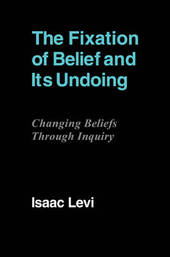
|
The Fixation of Belief and its Undoing: Changing Beliefs through Inquiry
Paperback / softback
Main Details
| Title |
The Fixation of Belief and its Undoing: Changing Beliefs through Inquiry
|
| Authors and Contributors |
By (author) Isaac Levi
|
| Physical Properties |
| Format:Paperback / softback | | Pages:208 | | Dimensions(mm): Height 229,Width 152 |
|
| Category/Genre | Philosophy - epistemology and theory of knowledge |
|---|
| ISBN/Barcode |
9780521110297
|
| Classifications | Dewey:121.6 |
|---|
| Audience | | Tertiary Education (US: College) | | Professional & Vocational | |
|---|
| Illustrations |
Worked examples or Exercises
|
|
Publishing Details |
| Publisher |
Cambridge University Press
|
| Imprint |
Cambridge University Press
|
| Publication Date |
7 May 2009 |
| Publication Country |
United Kingdom
|
Description
Isaac Levi's new book is concerned with how one can justify changing one's beliefs. The discussion is deeply informed by the belief-doubt model advocated by C. S. Peirce and John Dewey, of which the book provides a substantial analysis. Professor Levi then addresses the conceptual framework of potential changes available to an inquirer. A structural approach to propositional attitudes is proposed, which rejects the conventional view that a propositional attitude involves a relation between an agent and either a linguistic entity or some other intentional object such as a proposition or set of possible worlds. The last two chapters offer an account of change in states of full belief understood as changes in commitments rather than changes in performance; one chapter deals with adding new information to a belief state, the other with giving up information. The book builds upon topics discussed in some of Levi's earlier work. It will be of particular interest to discussion theorists, epistemologists, philosophers of science, computer scientists, and cognitive psychologists.
Reviews"The Fixation of Belief and Its Undoing is a paradigm of pragmatic philosophy, for it is a sustained and serious attempt at working out a theory of how inquiry is and should be conducted." Canadian Philosophical Reviews
|